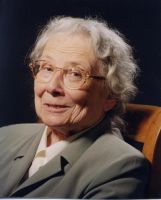Margot Becke-Goehring
Quotation: "For me there exists no specific male things excepted heavy work ..."
Why did I chose this woman?
I have chosen Professor Becke-Goehring, because I have made her acquaintance as a student at the Chemical Institute in Heidelberg. Personally she was both an outstanding scientist, as well as a highly experienced and appreciated teacher. I attended her excellent lectures regularly, which were of highly sophisticated quality and during many seminars and various examinations she appeared to me as a teacher with a lot of understanding and empathy for her students. In her public life, Mrs. Becke-Goehring was unique because she was really a record holder: she was the first female dean in the history of the University of Heidelberg, the first female chancellor of a university in the Federal Republic of Germany, as well as the first female member of two scientific academies. Indeed, she remains in the history of science as an outstanding chemist who opened up a new field of inorganic chemistry and also significantly contributed to the information science in chemistry by leading for ten years the Gmelin Institute for Inorganic Chemistry.
Biography
Becke-Goehring was the daughter of Martha and Albert Goehring. Her father was a career officer who worked after the First World War as an employee at the public utilities of the town of Gera.
Becke-Goehring graduated in the year 1933 at the high school in the city of Erfurt, and began her study in chemistry in Halle and Munich, doing this in opposition to the wishes of her parents, who were of the opinion that the study of chemistry is physically too hard for a woman. In 1938 she graduated under the direction of the German chemist Hellmuth Stamm (1901-1977) and remained at the university. Due to the fact that the majority of the young male population was in the army during World War II and following the suggestions of the chemist Karl Ziegler (1898-1973), in 1963 the Nobel laureate Chemistry, after she obtained her doctorate in 1944 she was able to very quickly develop her personal research results to the German academic post-doctoral grade of “habilitation”.
At the end of the Second World War Margot Becke- Goehring was interned shortly by the authorities of the U.S. army forces. Because she was utilizing deuterium oxide for her research program, although this has nothing to do with nuclear physics, the U.S. army forces falsely believed her to be involved in an assumed German nuclear program. In 1946 Becke-Goehring was a lecturer at the University of Heidelberg and in 1947 associate professor of the branch of inorganic chemistry.
In 1955 she married an industry chemist Friedrich Becke. In 1959 she became a full professor and in 1961 Dean of the Faculty of Science. In the same year she received the Alfred Stock Memorial Prize. 1966 Margot Becke- Goehring was elected as Rector of the Ruprecht-Karls-University of Heidelberg and was thus the first female rector elected at a West German university.
Her office of chancellor coincided unfortunately with the turbulent time of the 1968 student riots. In 1968, she voluntarily resigned, giving up her office, and in 1969 she became director of the Gmelin Institute of Inorganic Chemistry of the Max Planck Society in Frankfurt. In the following years she devoted herself to updating the Gmelin Handbook, in which the entire knowledge of inorganic chemistry is assembled. In 1979 she retired, but until her death in 2009, she continued to publish works about the history of science. She was elected 1969 a member of the German Academy of Sciences Leopoldina (founded 1st of January 1652 in the Holy Roman Empire) and was also since 1977 a regular member of the Heidelberg Academy of Sciences.
Publications (selected)
• The kinetics of dithionic (PhD 1938)
• The sulfoxylic (Habilitation 1944)
• Short manual for qualitative analysis (1961)
• Placement of qualitative analysis (1967)
• Coordination Chemistry (1970)
• Margot Becke- Goehring , Dorothee Mussgnug : Memories - Gone with the wind almost . University of Heidelberg
1933-1968 . Verlag Dieter Winkler, Bochum 2005
Appreciation
Web Links
- Literature by and about Margot Becke- Goehring1 in the catalog that German national library authority data (person): PND: 10471932X 2 | LCCN: n801491773 | VIAF: 29,974,359 4
Sources
- Photo used with the kind permission of the Heidelberger Akademie der Wissenschaften / EDV, http://www.adw.uni-heidelberg.de/gs/mitglieder-img.www/becke_m.jpg




